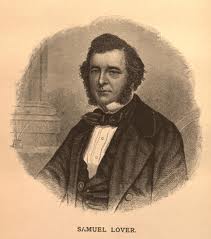Annotation:Whistling Thief (1) (The): Difference between revisions
No edit summary |
No edit summary |
||
| Line 1: | Line 1: | ||
{{TuneAnnotation | {{TuneAnnotation | ||
|f_tune_annotation_title=https://tunearch.org/wiki/Annotation:Whistling_Thief_(1)_(The) > | |f_tune_annotation_title=https://tunearch.org/wiki/Annotation:Whistling_Thief_(1)_(The) > | ||
|f_annotation='''WHISTLING THIEF [1], THE.''' AKA - "When Pat Came Over the Hill." English, Irish, Scottish; Air (6/8 time). England, Northumberland. G Major. Standard tuning (fiddle). AABB. "The Whistling Thief" was a popular song by the multi-talented Irish writer and composer Samuel Lover [https://en.wikipedia.org/wiki/Samuel_Lover] (1797-1868), written around 1839. The words (printed in Philadelphia in a 19th century broadside) go:[[File:lover.jpg| | |f_annotation='''WHISTLING THIEF [1], THE.''' AKA - "When Pat Came Over the Hill." English, Irish, Scottish; Air (6/8 time). England, Northumberland. G Major. Standard tuning (fiddle). AABB. "The Whistling Thief" was a popular song by the multi-talented Irish writer and composer Samuel Lover [https://en.wikipedia.org/wiki/Samuel_Lover] (1797-1868), written around 1839. The words (printed in Philadelphia in a 19th century broadside) go:[[File:lover.jpg|350px|thumb|right|Samuel Lover]] | ||
<blockquote> | <blockquote> | ||
''When Pat came o'er the hills, his colleen fair to see,''<br> | ''When Pat came o'er the hills, his colleen fair to see,''<br> | ||
Revision as of 16:12, 19 April 2020
X:1 T:Whistling Thief [1], The M:6/8 L:1/8 R:Jig B:Kerr - Merry Melodies vol. 3 (c. 1880's, No. 253, p. 28) Z:AK/Fiddler's Companion K:G e|d2B B2B|(B3 B2)e|d2B Bcd|(e3 e)fg| d2B B2B|(B3 B)cd|e2e fef|(g3 g2):| |:g|f2d e2^c|(d3 d2)g|f2d ed^c|(d3 d2)d|d2d def| g3 g2e|dBG A2G|g3 g2e|dBG A2B|(G3 G2):|

When Pat came o'er the hills, his colleen fair to see,
His whistle loud and shrill his signal was to be.
Oh, Mary, the mother cried, there’s some one whistling sure;
Oh, mother, you know, it's the the wind that’s whistling through the door.
(Whistles "Garryowen.”)
I’ve lived a long time, Mary, in this wide world, my dear
But the wind to whistle like that I never yet did hear;
But, mother, you know, the fiddle hangs close behind the chink,
And the wind upon the strings is playing a tune, I think.
(Dog barks.)
The dog is barking now, and the fiddle can’t play that tune;
But, mother, you know that dogs will bark when they see the moon.
Now, how can he see the moon, when you know he’s old and blind?
Blind dogs can’t see the moon, nor fiddles be played by the wind.
(Pig grunts.)
And now there is the pig uneasy in its mind;
But, mother, you know, they say that pigs can see the wind,
That’s all very well in the day, but then! may remark
That pigs, no more than we, can see the wind in the dark.
Now, I’m not such a fool as you think : I know very well it is Pat;
Get out, you whistling thief, and get along home out o’ that.
And you, be off to your bed, and don’t bother me with your tears,
For, tho’ I’ve lost my eyes, I have not lost my ears.
MORAL:
Now, boys, too near the house don’t courting go, d’ye mind,
Unless you’re certain sure the old woman’s both deaf and blind.
The days when they where young, forget they never can:
They're sure to tell the difference 'twixt wind, fiddle, pig, dog, or man.

